This organisation is working towards a cleaner and greener India through its plantation and awareness drives
Shankar Singh was very keen on contributing to the country’s Swachh Bharat mission. In 2019, he started Vrikshit Foundation in Delhi and has since organised over 150 clean-up and plantation drives across the country.
Britannia Chowk in Delhi is usually characterised by mounds of garbage and an acrid smell. However, a few months ago, the place witnessed a total transformation. A bunch of young and enthusiastic individuals from an NGO gathered all the litter with shovels and swept the area until it was as clean as a whistle.
Despite being one of the prime commercial and industrial localities in the National Capital Region, the government, as well as the locals, had disregarded the piling trash.
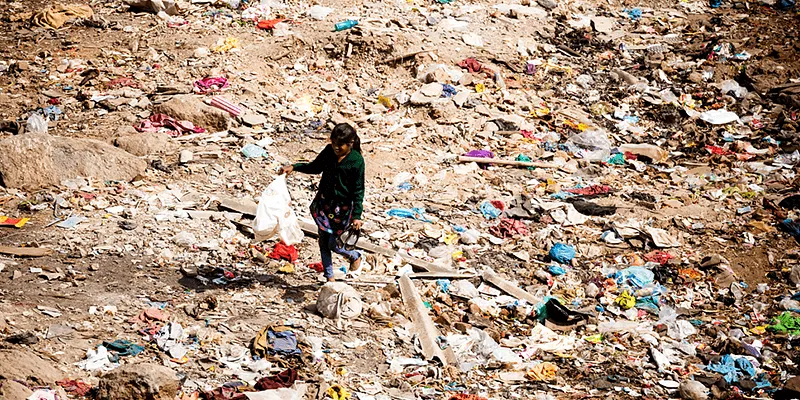
Image credit: Shutterstock.
However, this is just one of the many places in India where waste management poses a challenge.
According to the Environmental Performance Index (EPI) of 2018, which evaluated factors like hygiene, air quality, waste management, and ecological sustainability, India ranked 177 out of 180 countries. This goes to show that several parts of the country were reeling due to high pollution levels and struggling to treat its solid waste in a streamlined and scientific manner.
Rapid urbanisation, lack of awareness, inadequacy in infrastructure, and loopholes in the waste disposal system are known to be some of the main reasons for this.
To improve the situation and pave the way for a cleaner India, the government launched the Swachh Bharat Mission in October 2014. Though the campaign made huge strides towards building better sanitation systems and more efficient waste processing/recycling units, there is still a long way to go.
23-year-old Shankar Singh was very keen on contributing to the country’s Clean India mission. So, in 2019, he started Vrikshit Foundation in Delhi with a few of his childhood friends. Since then, the voluntary organisation has been tirelessly working to create breathable and hygienic surroundings for people to live in.
“Many times, people tend to blame the government authorities for not keeping their neighbourhood tidy. But what they don’t realise is that cleanliness is a collective responsibility. Our goal was to help them understand this and involve the citizens at the ground level,” Shankar Singh, Founder and President, Vrikshit Foundation tells SocialStory.
The foundation is attempting to accomplish its objective by conducting cleanliness drives, awareness programmes, and plantation events.
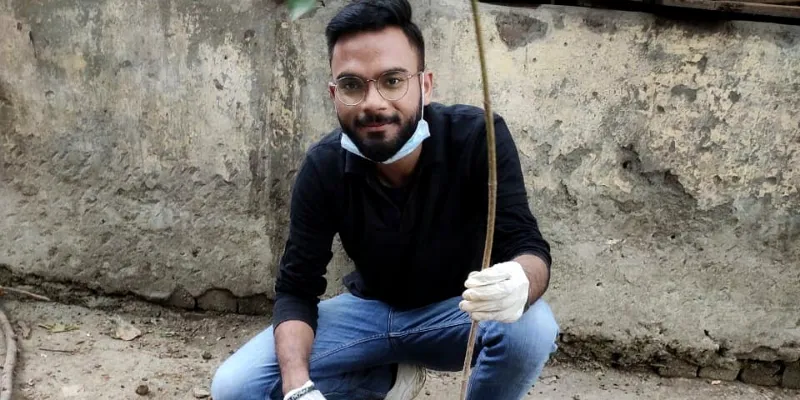
Shankar Singh, President and Founder, Vrikshit Foundation.
The initial phase
Shankar was born and brought up in Delhi – a city that was defined by traditional bazaars and botanical houses. After his schooling, he pursued Computer Engineering from Deenbandhu Chhotu Ram University of Science and Technology, Murthal (Sonepat). His career kicked off as a software engineer with a tech company.
Shankar, who is environmentally conscious, had a deep desire to contribute to sustainable initiatives and the natural ecosystem as a whole.
In May 2019, he came across a poster that was put up by ASSOCHAM. It was a call for citizens to participate in a clean-up drive in Mumbai. That was when he thought of organising a similar event in his city.
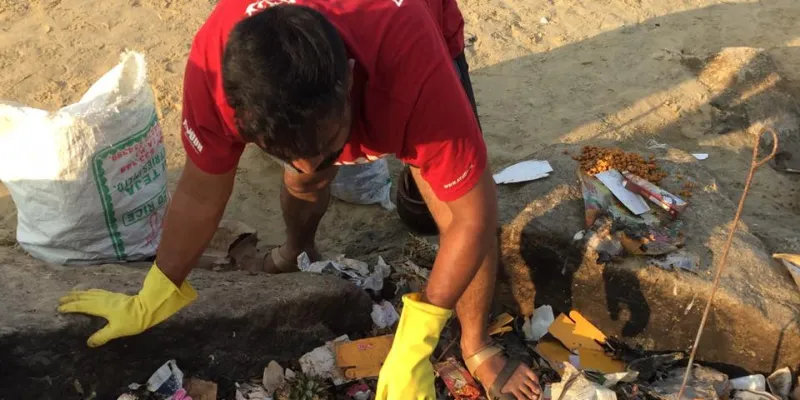
One of the volunteers of Vrikshit Foundation participating in a clean-up drive.
However, before executing his plan, he wanted to get a sense of the ground reality.
“I knew that Yamuna river was one of the main sources of water for Delhi. I had also observed the layers of froth floating on the surface of its water. Many reports claimed that the outflow of pollutants, sewage, and industrial wastes into the river had rendered it toxic. Therefore, I and a couple of friends decided to get our hands dirty and clean a part of the river,” recalls Shankar.
Shankar and his buddies spent a long time wading in knee-deep water and pulling out a bunch of polythene covers, paper waste, rotten garlands and fruits, discarded clothes, and other materials. When they posted a before and after picture of the river on their social media handles, they received an overwhelming response.
“A lot of people sent us direct messages on Facebook and Instagram appreciating our work and asking about when we will be engaging in another such activity. Some even inquired if they could join our future clean-up endeavours,” says Shankar.
At that very instant, Shankar came up with the idea of establishing a voluntary organisation to clean-up public spaces. In September 2019, he sowed the seeds for Vrikshit Foundation.
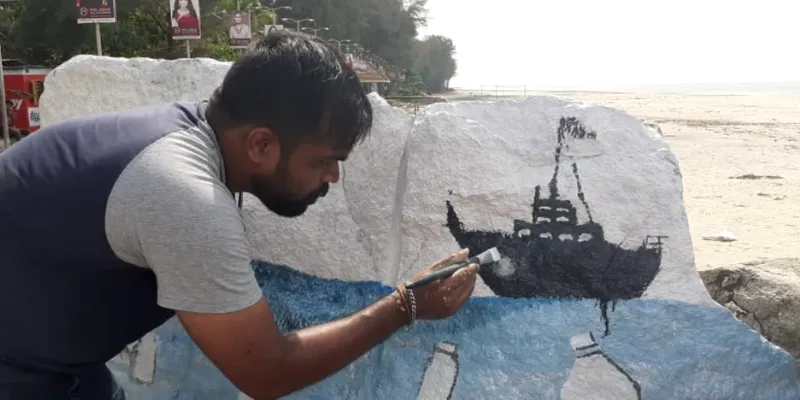
A wall painting in progress as part of the NGOs event.
Involving the community
The first clean-up drive that was organised by the foundation saw participation from only four volunteers. Over time, more people began joining the initiative.
Most of the organisation’s initiatives take place on weekends to add to the convenience of students and working professionals. The location is either decided based on citizens’ request or through physical surveys that the team undertakes. And, the NGO manages to fund most of the events through individual donations or online crowdsourcing platforms.

A group of young volunteers at the location of the event.
“In the last year, our voluntary base has expanded both in and outside Delhi. We have volunteers stationed in several localities across 11 states. So, whenever any of them witness a playground, slum or water body overflowing with garbage for a long period, they inform the foundation. We generally proceed with the clean-up drive after a quick verification,” explains Shankar.
Once the time and location of the event are finalised, the NGO puts up the details on their social media pages with a registration link. The drives organised by Vrikshit Foundation do not attract any fee and are open for all. Even the safety equipment and other tools like gloves, masks, shovels, etc, are provided to the volunteers as soon as they arrive at the location.
All the gathered waste is collected, segregated and sent to either private waste recycling facilities or handed over to the municipal authorities.
When asked about some of the challenges along the journey, Shankar replies,
“Despite us working hard and tidying up public areas, we noticed that in a week or two, it was back to its original filthy state. We overcame this challenge by interacting with the residents and commercial owners in the area and appealing to maintain cleanliness. Involving the local community is imperative to fulfilling the mission.”

Creating a positive change, one drive at a time
Since its inception, Vrikshit Foundation has organised 150 clean-up drives in more than 15 cities including Delhi, Jaipur, Ajmer, Amritsar, Gurugram, Hyderabad, Bengaluru, and Chennai. In the last few months, it has also been conducting awareness campaigns in educational institutions and large-scale plantation drives in large open spaces and playgrounds.
22-year-old Tanya Gupta has been volunteering for the Vrikshit's clean-up drives since the beginning of its establishment. Every time the NGO organised a drive Tanya made it a point to travel around 42 kilometers from her hometown of Ghaziabad to Delhi.
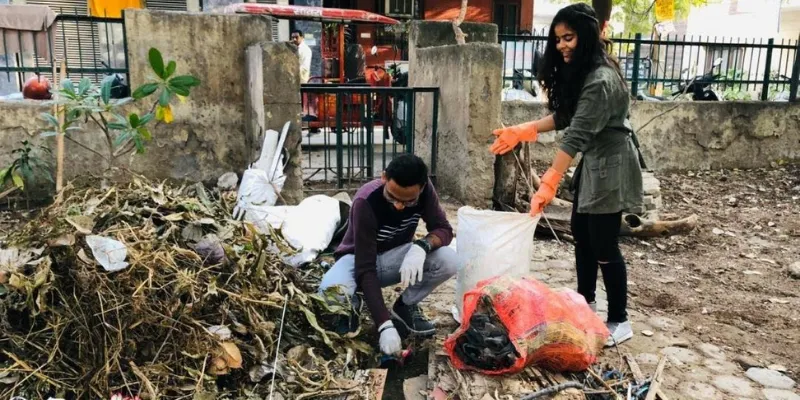
Tanya Gupta travels from Gurugram to Delhi to volunteer for the clean up drives.
"I have participated in more than 35 drives so far. And, the amount of satisfaction I derived from cleaning these places and making way for better public health was immense," she says.
Unclean and unhygienic public spaces are not only detrimental to the environment, but also human health.
“The carbon dioxide and methane that is emitted from garbage poses a huge risk to the atmosphere. If left untreated for a long time, particles from the waste trickle down and contaminate the groundwater. All of this can be avoided if citizens make an effort to keep their surroundings clean,” adds Shankar.
The organisation is planning to host more events in the near future to impact a sustainable change in the community.
Edited by Kanishk Singh









